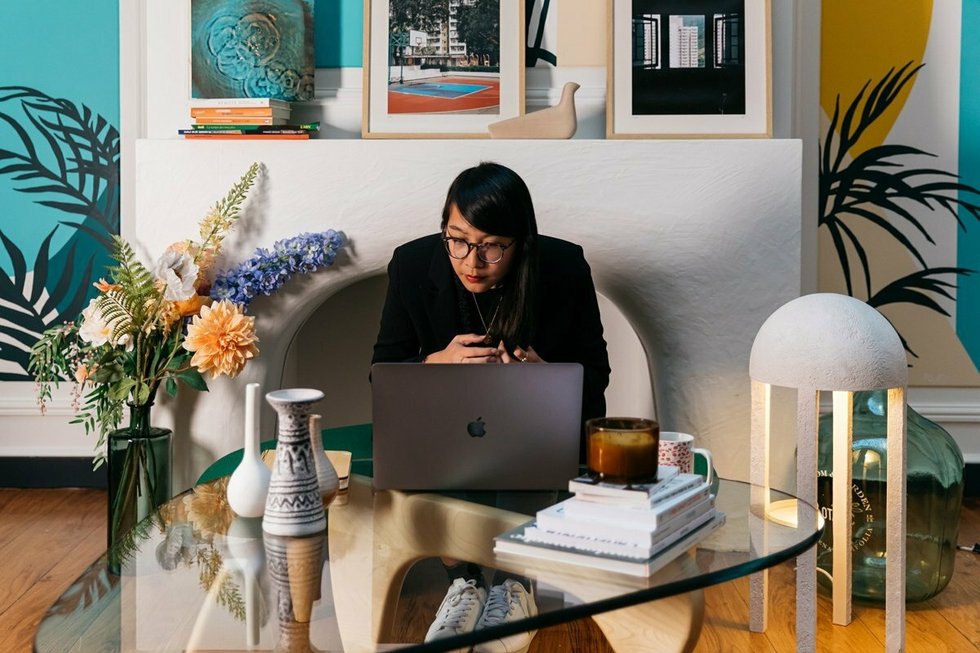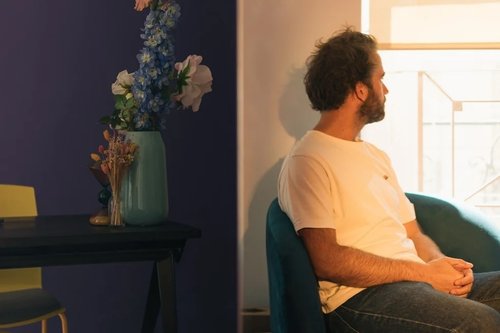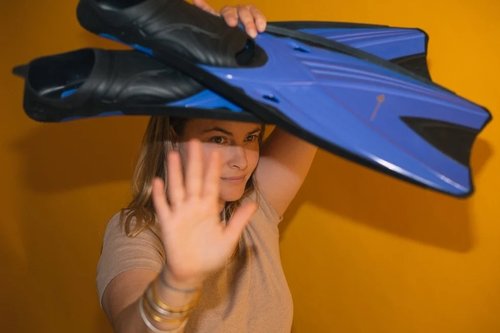Why can’t I stop looking at myself during video calls?
Feb 07, 2022
3 mins


Journaliste indépendante.
Has working from home during the pandemic meant trading in your coworker Roger’s bad breath for close-ups of that zit on your forehead over Zoom? When it comes to video meetings, some people hate having to look at their own faces all the time, while others enjoy it (looking at themselves, not the zits). We all try to pay attention and look at the speaker or the camera, but it’s hard not to keep looking at yourself. Why is that? To find out, we spoke to Delphine Py, a psychologist and founder of the French app Psynergy, which offers online access to trained experts.
Mirror mirror, on the wall, who’s the fairest one of all?
Jeremy Bailenson, a professor of communication science at Stanford University, was studying why videoconferences are so tiring for remote workers when he stumbled onto an unexpected phenomenon: seeing your own image being streamed live is stressful for the brain. Much like when you look in a mirror, you’re much more likely to judge yourself more harshly than you would judge others, according to Bailenson. It’s a little like someone following you around all day and holding a mirror up to your face every time you speak. Sounds awful, doesn’t it?
Psychologist Delphine Py has observed this phenomenon too. “Seeing your own image all day long is not natural,” she says. “It can lead to you being more critical of yourself and can lower your self-esteem.” She explains that human beings have an inner voice that is often very critical. When looking at others, we consider the whole person. When looking at ourselves, we zone in on the details, particularly any problem areas. You may find it easy to see past the acne on the young intern’s cheeks, but struggle not to be mesmerized by your own crooked nose, receding hairline, and pale complexion. That’s tough.
What you see is what you get
Have you heard the expression “Zoom vanity”? It means staring at your own image during a virtual meeting, rather than focusing on others with you in the meeting. Is this just a symptom of acute narcissism?
Nope! Recent studies led by Kristine Kuhn, an associate professor at Washington State University, have shown that those with the least self-confidence are the ones who look at themselves the most. Sound counterintuitive? Not necessarily. “There are several possible explanations for this,” says Py. “People who lack self-confidence might be trying to see if they look ‘like they should’. But sometimes it’s simply an unconscious avoidance strategy: because looking at other people can trigger stress, looking at yourself then lets you avoid being confronted with someone else’s gaze.”
Boost your confidence and improve your non-verbal communication skills
Happily, your self-confidence levels can be improved, according to Py. You can learn to be more forgiving of yourself, the same way you are with other people. While this kind of self-improvement may take time, there are a few simple tricks that will allow you to work on both your confidence and your non-verbal communication during video meetings in the short term.
Turn your camera off, or if you can’t, get farther away from your screen. “It’s very unusual for human beings to see other people and themselves so close-up in real life,” explains Py. “Getting farther away from the camera won’t let you see your so-called flaws as easily, and also lets the other person see your gestures more clearly, and therefore better understand your non-verbal communication.”
Keep your eyes on the camera when you speak. “In a situation where you’re being evaluated, like in a job interview or an annual review, you’ll give the impression that you’re really looking at them and that will improve the way the conversation is being perceived,” she says. An added benefit: if you’re looking directly at the camera, you’re not looking at yourself.
Place your screen slightly higher up. “This will force you to lift your chin, and thus look more confident. On the other hand, lowering your head puts you in a position of subordination,” says Py.
What if one of the best solutions for making the most of video calls is a little plastic surgery? A couple shots of botox and off you go? Spoiler alert: that’s not the solution. Nonetheless, it’s what a lot of workers have decided to do since the beginning of the pandemic.
In the United States, the number of consultations has gone up 64%. So is it just an American phenomenon? Apparently not. The Champs-Elysees clinic in Paris, which is one of the biggest in Europe, has seen an increase of 30% in the level of work performed since the beginning of the pandemic. What’s on the menu? Chemical peels, injections, and laser therapy. Such tweakments – little, non-invasive cosmetic treatments – are popular now with those who want to look better on screen.
If that’s the answer, maybe Roger and his awful breath doesn’t sound so bad after all.
Translation by Kalin Linsberg
Photo: Welcome to the Jungle
Follow Welcome to the Jungle on Facebook on LinkedIn and on Instagram and subscribe to our newsletter to get our latest articles every day!

More inspiration: Remote work

Office FOMO? New employees may be missing out on career growth opportunities
Young employees working remotely may be missing out on key career growth opportunities—are the trade-offs worth it?
Oct 31, 2024

The do's and don'ts of working remotely on vacation
Can you truly combine work and vacation? With remote working becoming more popular, many are exploring their options.
Jul 18, 2024

Can remote work and parenting coexist?
Remote work is a godsend for many parents, but that doesn't mean it's easy. How can you make working from home work for you?
May 15, 2024

Where do freelancers fit into the new fractional world of work?
The shifting tech job market is fueling the rise of fractional work and transforming traditional employment …
Jan 29, 2024

Why I chose to go back to the office
Although remote work provides flexibility and autonomy, some employees are choosing to go back to the office. To find out why...
Jan 03, 2024
The newsletter that does the job
Want to keep up with the latest articles? Twice a week you can receive stories, jobs, and tips in your inbox.

Looking for your next job?
Over 200,000 people have found a job with Welcome to the Jungle.
Explore jobs